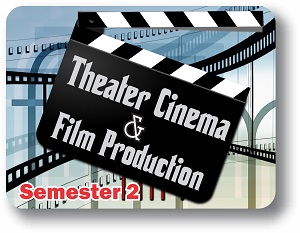
Lights! Camera! Action! This course will introduce students to the basics of film and theater productions. Students will learn about the basics of lighting, sound, wardrobe, and camerawork for both film and theater settings. The course also explores the history of film and theater and the influence that they have had on society. In this semester, you will learn about scripts in both film and theater as well as dramatic structures that are used in performances, the areas of directing and acting in both film and theater contexts, characteristics and skills that good actors and directors possess and cultivate, all the different elements of theater and film—lighting, sound, costume and makeup, directing, and acting—all come together to become a production. You will learn about how an audience can affect film and theatrical productions in North America, learn about a variety of film genres as well as their hallmark characteristics, learn about several theater genres and their defining characteristics.
You will be required to own or have access to the standard editions of the three films used in this course:
If you do not already have access to these movies, you may consider other sources such as your local library.
Note: Timestamps referenced throughout the course apply to standard editions of the applicable film and may not align with any extended/modified versions
Unit 7: Plotting the Script
In this unit, you will learn about scripts in both film and theater as well as dramatic structures that are used in performances. Finally, you’ll learn about what makes some script performances controversial.
What will you learn in this unit?
Unit 8: Acting and Directing
In this lesson, you will learn about the areas of directing and acting in both film and theater contexts. You’ll learn about the characteristics and skills that good actors and directors possess and cultivate.
What will you learn in this unit?
Unit 9: The Film Production Process
In this lesson, you will learn how all the different elements of theater and film—lighting, sound, costume and makeup, directing, and acting—all come together to become a production. You’ll learn the sequence of events in the production process of both film and theater. And you’ll apply your technical knowledge from previous units to the production process.
What will you learn in this unit?
Unit 10: Audiences and Economics
In this lesson, you will learn how an audience can affect film and theatrical productions in North America. You’ll look at the role and characteristics of theater audiences at a few specific moments in history. And you’ll consider the impact that film and theatrical productions can have on their local communities and economies.
What will you learn in this unit?
Unit 11: Film Genres
In this unit, you will learn about a variety of film genres as well as their hallmark characteristics. You’ll see how films can cross genres, and you’ll research a specific genre to learn how filmmakers work within it to tell stories.
What will you learn in this unit?
Unit 12: Theater Genres
Like film, theater also has genres of plays and performances. In this unit, you will learn about several theater genres and their defining characteristics. You’ll also see how the formation of these genres has been affected by social, cultural, and historical contexts.
What will you learn in this unit?
